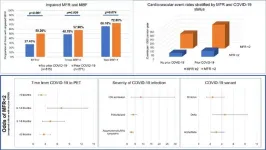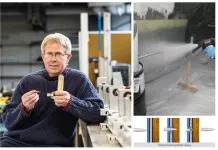(Press-News.org) Patients with heart disease could benefit from less extensive interventions thanks to cutting-edge technology that creates 3D computer models of blood flow through the heart's arteries, according to research presented at the British Cardiovascular Society in Manchester.
When the research team trialled the VIRTUHeartTM technology with doctors treating heart attack patients, they found that using it would have changed the treatment of more than 20 per cent of patients. In many cases, it would have led to fewer patients undergoing an invasive procedure such as having a stent fitted.
By giving doctors a clearer picture of a patient’s arteries, the research funded by the British Heart Foundation (BHF) showed that VIRTUHeartTM could help more heart patients to get the right treatment for them, free up doctors’ time and better meet demand on heart care services.
The researchers are currently investigating the impact this technology could have if it was used widely in the NHS, including the effect it might have on waiting lists. They hope that it could be in use in as little as three years.
Dr Hazel Arfah Haley, Interventional Cardiologist at Sheffield Teaching Hospitals NHS Foundation Trust, led the study. She said:
“By giving doctors a better understanding of what is happening inside their patient’s blood vessels, we’ve shown that this technology has the potential to help improve how we assess and treat heart disease, ensuring patients have the treatment that best meets their needs.
“Our team are also investigating whether VIRTUHeartTM could improve treatment for people with another common heart condition called angina, helping to make sure that even more patients get the treatment they need first time around.”
There are up to 250,000 coronary angiograms performed in the UK every year1 - a test which allows doctors to look inside a patient’s coronary arteries (which supply the heart muscle with blood) and check for blockages. This is one of the first tests that patients admitted to hospital with a heart attack will undergo and helps doctors plan treatment to restore blood supply to the heart muscle.
But angiograms can be hard to interpret when an artery is only partly blocked, and this can make it challenging for treatment decisions to be made, particularly when doctors are managing patients with complex heart disease.
The innovative technology, developed by researchers at the University of Sheffield, re-creates another invasive but underused test called a Fractional Flow Reserve (FFR) in which doctors insert a special wire into arteries to calculate how well blood is flowing. FFR is underused for several reasons including time pressure, availability, complex anatomy, and operator’s familiarity.
Using only the images from a patient’s angiogram, VIRTUHeartTM works as a “virtual FFR” and creates computer models of their blood vessels, allowing doctors to calculate blood flow and find out more about the extent of blockages.
Professor Sir Nilesh Samani, Medical Director at the British Heart Foundation, said:
“There are around 100,000 hospital admissions each year due to heart attacks, mostly caused by the coronary arteries becoming narrowed and blocked by a build-up of fatty plaques.
“Technologies like VIRTUHeartTM show real promise to improve treatment as well as reducing unnecessary interventions, expense and complications and freeing up clinicians’ time to treat other patients.”
The study involved 208 patients who were admitted to hospital with an NSTEMI – a type of heart attack where the affected coronary artery isn’t completely blocked. All of the patients had their coronary arteries reconstructed using VIRTUHeartTM.
After the patients had been treated, the researchers revealed the virtual blood vessel models to their doctors. They found that using the technology would have changed how doctors treated 46 patients (22 per cent). Of these, 21 patients who had an invasive procedure such as a stent would have instead been treated with medication only if the technology had been used to plan their treatment.
Overall, using VIRTUHeartTM to plan treatment would have led to 42 fewer stents being fitted – a decrease of 18 per cent.
The VIRTUHeartTM system was developed by the Mathematical Modelling in Medicine research group in the department of Infection, Immunity and Cardiovascular Disease at the University of Sheffield, in partnership with the Insigneo Institute and Sheffield Teaching Hospitals NHS Foundation Trust.
ENDS
To request interviews or for more information please call the BHF press office on 020 7554 0164 or email newsdesk at newsdesk@bhf.org.uk.
Notes to editors
1 British cardiovascular intervention society audit results: https://www.bcis.org.uk/audit-results/
Images of vessels in VIRTUHeartTM available: https://we.tl/t-vW4nRJvFEw
Conference abstracts available on request.
About the British Heart Foundation
It is only with donations from the public that the BHF can keep its life saving research going. Help us turn science fiction into reality. With donations from the public, the BHF funds ground-breaking research that will get us closer than ever to a world free from the fear of heart and circulatory diseases. A world where broken hearts are mended, where millions more people survive a heart attack, where the number of people dying from or disabled by a stroke is slashed in half. A world where people affected by heart and circulatory diseases get the support they need. And a world of cures and treatments we can’t even imagine today. Find out more at bhf.org.uk
About the British Cardiovascular Society (BCS)
BCS is the voice for those working in cardiovascular health, science and disease management in the UK; we aim to promote and support both the healthcare professionals who work in cardiology and the patients for whom we want to encourage the best possible treatment. Our members are healthcare professionals, working in the field of cardiovascular health.
Find out more at bcs.com.
END
The International Society for Stem Cell Research (ISSCR) today released the ISSCR Standards for Human Stem Cell Use in Research, an international collaboration aimed at enhancing rigor in preclinical research and ultimately strengthening the pipeline of therapies for patients.
“This nearly two-year initiative is groundbreaking for the global stem cell research community,” said Haifan Lin, ISSCR president. “The international standards will make a big difference in the quality of science that is performed and published worldwide.”
The ISSCR is the preeminent international stem cell research society with a reputation ...
Have you ever wanted to convey a feeling but just couldn’t find the right words? Millions of people struggle with a personality trait known as alexithymia, which means “no words for feelings.” Individuals with alexithymia have difficulty identifying and describing their emotions. This trait can harm their social and intimate relationships. They are likely to miss social cues and thus fail to recognize or understand the feelings of others. Past research has suggested that a history of child maltreatment could play a role in developing adult alexithymia.
A new meta-analysis published this month in Psychological Bulletin, led by Stanford ...
Patients infected with beta and delta COVID-19 variants, and those who required hospital stays for COVID-19 infection, were more likely to experience heart issues associated with long COVID, according to a recent Houston Methodist study published in the European Heart Journal – Cardiovascular Imaging. Patients recovering from the omicron variant were least likely to have microvascular involvement.
“This new data expands our understanding of myocardial flow reserve as an important prognostic marker in general and specifically in COVID-19,” said Mouaz Al-Mallah, M.D., corresponding author of the study and director of cardiovascular ...
Contact: Clare Leahy clare.leahy@hdruk.ac.uk 07748016062
Event registration for press: https://bit.ly/45rIQBr
Health Data Research UK (HDR UK) is launching its Health Data Science Black Internship Programme for the third year running at its Opening Ceremony on Wednesday 21 June from 12-5pm at the Curzon Building in Birmingham City University.
The programme, run in partnership with the UK Health Data Research Alliance and 10,000 Black Interns is helping to tackle the underrepresentation of Black people within science, technology, engineering, and mathematics ...
DARIEN, IL – Sleep researcher Dayna A. Johnson is the recipient of the 2023 Diversity, Equity and Inclusion Leadership Award from the Associated Professional Sleep Societies, a joint initiative of the American Academy of Sleep Medicine and the Sleep Research Society.
The award recognizes individuals who have made significant contributions to sleep medicine or sleep and circadian science through their work to increase the diversity, equity, and inclusion of sleep medicine providers, or to develop educational programs, research, or clinical work aimed at reducing disparities. The award presentation occurred Monday, June 5, during the plenary session of the ...
Patents from the Naval Postgraduate School (NPS) are a measure of novel inventions, but each also tells a story of a relevant idea with warfighting impact. NPS Department of Physics Associate Professor Ray Gamache and his former graduate student, NPS alumnus U.S. Marine Corps Maj. Chris Phifer, developed and recently patented a new polymer-based, self-sealing fuel line capable of withstanding a .50 caliber bullet without losing so much as a single drop.
“We’re not just a physics department, we’re the applied physics department,” Gamache said. “While ...
1. A supervised hospital walking program may reduce nursing facility admissions for older adults
Abstract: https://www.acpjournals.org/doi/10.7326/M22-3679
URL goes live when the embargo lifts
A randomized trial of older veterans found that hospitalized persons enrolled in a supervised walking program known as STRIDE (AssiSTed EaRly MobIlity for HospitalizeD VEterans) were less likely to be discharged to a skilled nursing facility. However, the authors noted that participation in the program was low and there was no change associated with length of hospital stay or inpatient falls. The study is ...
Tirzepatide is a recently approved treatment for type-2 diabetes. Treatment with tirzepatide decreases body weight while improving glucose metabolism in patients with obesity and type-2 diabetes. Although the drug is designed to activate receptors for glucagon-like peptide-1 (GLP-1) and glucose-dependent insulinotropic polypeptide (GIP), the contribution of activating the GIP receptor in the overall efficacy of tirzepatide is not fully understood. A team of researchers demonstrated for the first time that tirzepatide stimulates insulin secretion in the human pancreas via the GIP receptor. These results contrast with findings in ...
Tinnitus, the ringing, buzzing or hissing sound of silence, varies from slightly annoying in some to utterly debilitating in others. Up to 15% of adults in the United States have tinnitus, where nearly 40% of sufferers have the condition chronically and actively seek relief.
A recent study from researchers at the University of Michigan’s Kresge Hearing Research Institute suggests relief may be possible.
Susan Shore, Ph.D., Professor Emerita in Michigan Medicine’s Department of Otolaryngology and U-M’s Departments of Physiology and Biomedical Engineering, led research on how the brain processes bi-sensory ...
“The current study analyzed the correlation between BORIS mutations and the expression of the protein in breast cancer cases.”
BUFFALO, NY- June 5, 2023 – A new research paper was published in Oncotarget's Volume 14 on May 26, 2023, entitled, “Association of mutation and expression of the brother of the regulator of imprinted sites (BORIS) gene with breast cancer progression.”
The brother of the regulator of imprinted sites (BORIS), 11 zinc-finger transcription factors, ...





